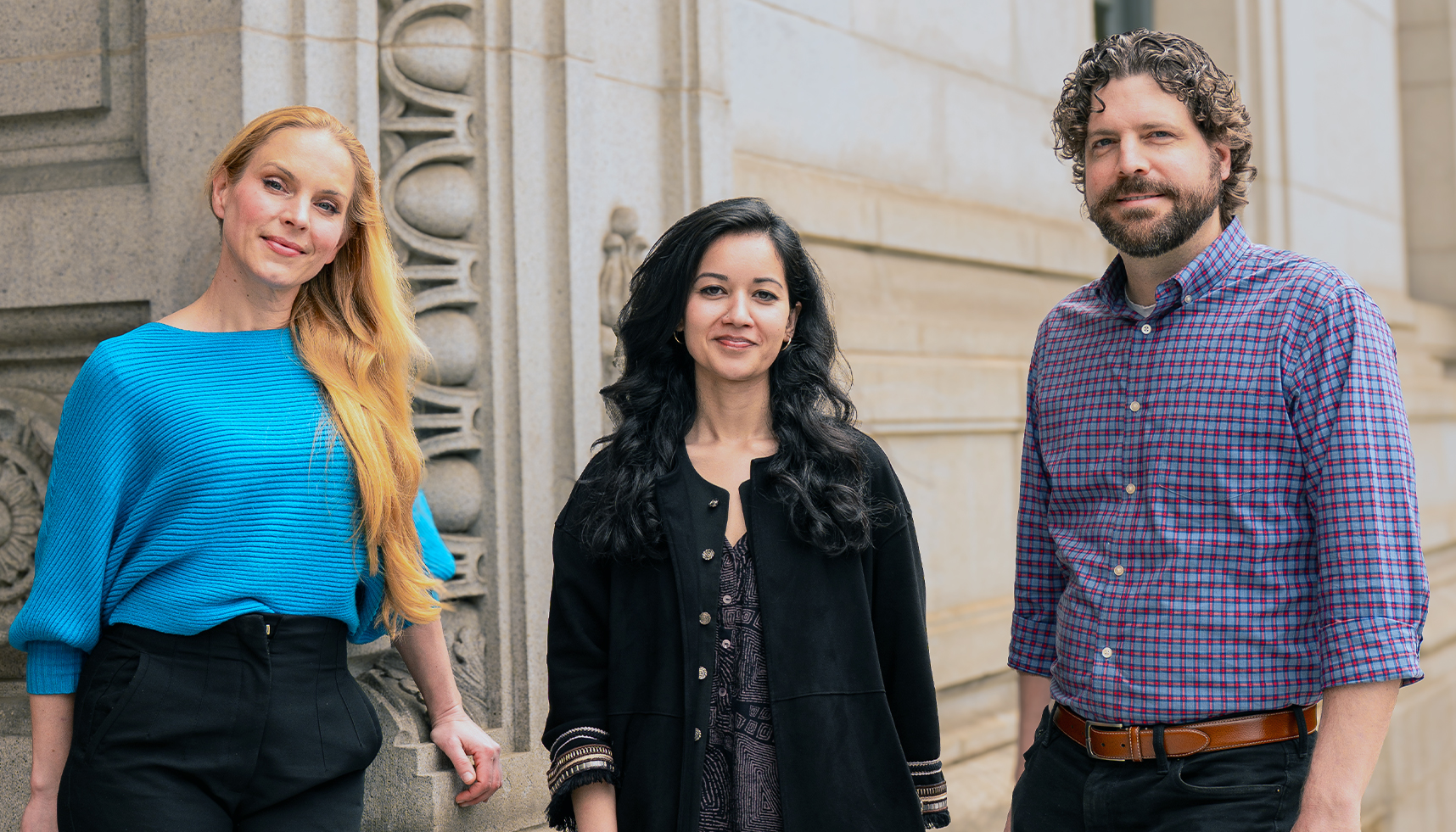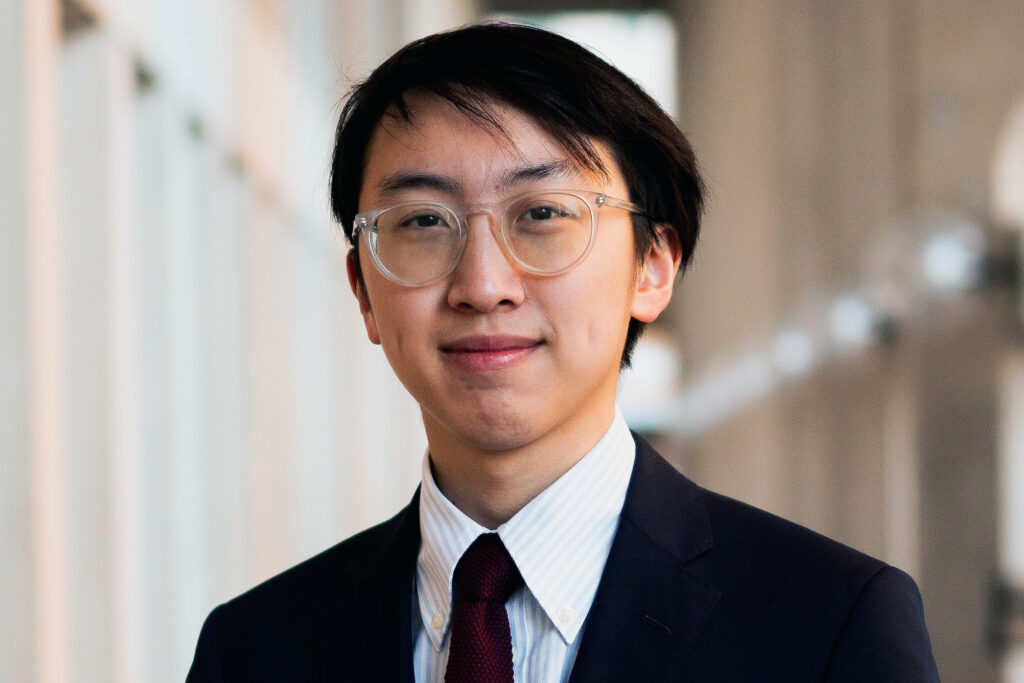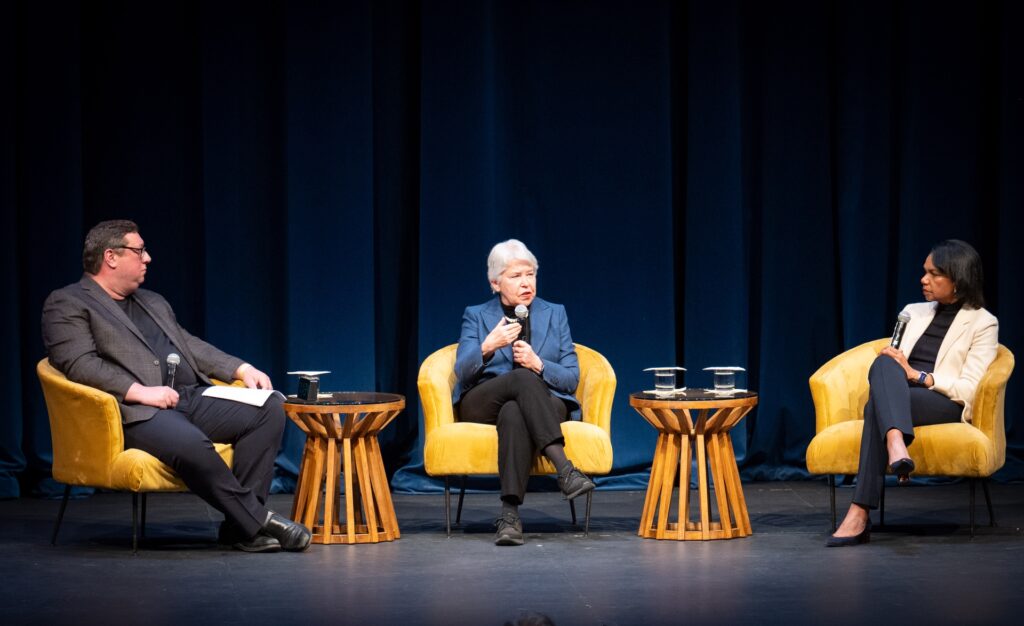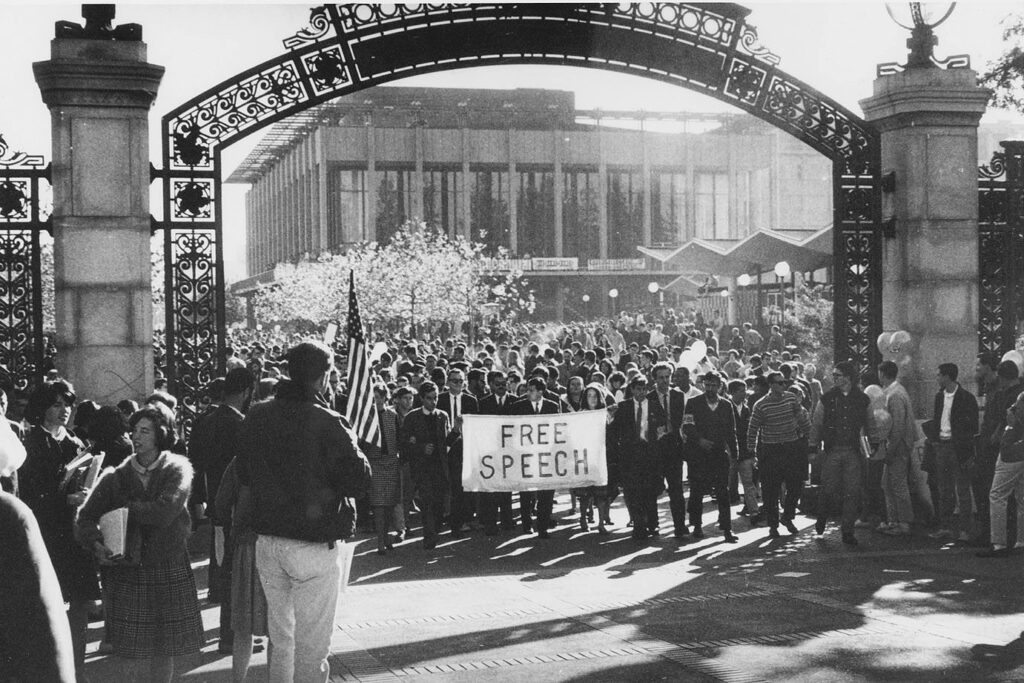With right and left deeply divided, emerging UC Berkeley groups embrace the ‘vital center’
According to a popular, if inaccurate, caricature, Berkeley is an ideological monoculture. Now three growing campus organizations are working to expand the space for diverse political perspectives.

Stanley Luo, UC Berkeley
May 5, 2025
Nathan Tang arrived on campus in the autumn of 2023, a young, hopeful idealist — but not one in the stereotypical UC Berkeley mold. He was a traditional Roman Catholic, and his faith informed his deeply considered political and cultural views. He was a liberal, but cautious in his liberalism. He did not identify as a conservative, but some of his views definitely leaned right.
Coming from the East Coast, Tang knew of Berkeley’s reputation for progressive activism, and he wondered whether he would fit, even in the College of Chemistry, where he would seek his Ph.D.

His experience, however, has run counter to the caricature. He connected with the new campus chapter of the Heterodox Academy, a national organization dedicated to expanding the diversity of viewpoints on a campus. Today, as a co-chair of the group, he’s helping to drive discussions across a range of highly contentious issues in politics and education, from conventional admissions tests and DEI hiring statements to the role of free speech and open inquiry in campus culture.
“If we stay in spaces where we expect to be comfortable, when people disagree with you, they might listen without responding, or they’ll ostracize you by being passive-aggressive,” Tang explained recently. “Ultimately, I came to Berkeley to be intellectually challenged, inside and outside of the lab. We need to be willing to disagree with each other openly, but to do so civilly. I want others to be intellectually charitable to me, and I want to do the same to them.”
Berkeley Chancellor Rich Lyons calls it “the constructive collision of ideas” — and that’s the spirit that animates the Heterodox Academy, known as HxA by a few dozen local members. Along with the loosely allied Berkeley Initiative for Free Inquiry (BIFI) and the more-established Berkeley Liberty Initiative, HxA Berkeley is trying to counteract toxic polarization by expanding the space where liberals, moderates and conservatives can find constructive engagement.
According to leaders of these emerging groups, and Berkeley’s leadership, universities can only benefit from a robust diversity of perspectives and voices.
Will Fithian, a Berkeley associate professor of statistics and a co-founder of BIFI, imagines himself in the shoes of a campus conservative. “If I were actually advocating for substantive conservative policies — if I were advocating immigration restrictions, for example, or a ban on abortion … it probably would be uncomfortable for me to be at Berkeley,” he said. “Not as uncomfortable as most people outside of Berkeley think, but more uncomfortable than it should be.”
Chancellor Lyons: “These values need and demand our defense”
Smriti Mehta, a former graduate student in psychology, last year was named executive director of the Berkeley Liberty Initiative and plays a leadership role in all three groups. She believes the fear of voicing unpopular views extends even to moderates and liberals.
“A lot of people in various departments are afraid to speak up,” Mehta said. “They don’t think there are other people who agree with them, or that there are other people that they could bounce their ideas off of. So the social support and the social network is really important — and that’s the role that we play.”
In the context of recent events that have sparked passionate debate, such as the police murder of George Floyd and the unrelenting violence of the Hamas-Israel conflict, the leaders of the emerging groups say they’re seeking to foster dialogue and a healthy competition of ideas.
That process can be uncomfortable, but the groups have quietly won attention from campus leaders, including Lyons and his predecessor, Carol Christ.
In a statement earlier this year, Lyons said the campus’s principles of community express such values, including “civility in our interactions, respect for our differences, and reverence for diversity writ large — diversity of origins and identities, (and) diversity of viewpoints and beliefs.”
Abandoning those values would endanger not just Berkeley’s scholarly influence, but “our ability to be a campus where all can feel safe, respected, and welcome,” he said. “These values need and demand our defense.”
Shouting down opposing viewpoints
Conflicts around free speech have been a persistent theme on campus in recent years. Last year, about 200 pro-Palestinian protesters violently forced the cancellation of a talk by Israeli military reservist and attorney Ran Bar-Yoshafat. A couple of weeks later, the Berkeley Liberty Initiative hosted former U.S. Secretary of State Condoleezza Rice in a public discussion with Christ, and protesters repeatedly disrupted the event.

Keegan Houser/UC Berkeley
Those protests reflect tensions over national and international issues, but campus issues have been polarizing, too — policing policy, for example, or standardized SAT and GRE testing for student applicants.
Republican students in the past have described attacks on their Sproul Plaza tables, or hidden their conservative identity for fear of being penalized in class or ostracized socially.
Similarly, both Tang and Mehta describe how moderate and center-left students have felt stigmatized when they deviate from the dominant political line in their departments or social circles.
The political consequences of public perceptions
Julia Schaletzky is the executive director of Berkeley’s Molecular Therapeutics Initiative and also serves in leadership positions for both BIFI and HxA Berkeley. To explain the political climate at Berkeley, she cites the Overton Window, a model that describes how mainstream opinions can become unacceptable as a community shifts to the right or the left.

University Archives photo, courtesy of Bancroft Library.
“People are mostly moderate,” Schaletzky said. “But the Overton Window for campus has shifted such that even some moderate people feel they can’t speak out anymore. Think of the issue of crime: A middle-of-road argument would be that we need to hold criminals accountable for the crimes they commit, and a majority of Americans would agree.
“But on our campus, this is not a consensus opinion.”
Leaders of the Berkeley groups say that when colleges and universities are perceived as drifting too far from the mainstream, there are consequences in public opinion. They point to a national Pew report, released last October: Seven in 10 Republicans surveyed felt that higher education is not having a positive impact on the country.
A pariah, a monster — or a free-thinker?
Schaletzky, Fithian and Mehta say the emergence of their groups, dominated by faculty members, is a direct response to these trends. Though there are few conventional conservatives among them, their membership is composed of moderates, independents and free-thinkers. Historian Daniel J. Sargent may be emblematic.

“I think the world is complicated,” said Sargent, an associate professor of history and public policy who serves on the BIFI executive committee. “Many of the policy dilemmas that we confront are inherently complicated, and I think there’s wisdom on both sides of the political spectrum from time to time. … I’m probably on the left of the American electorate, but on the right of the Berkeley faculty.”
The Berkeley Liberty Initiative is the oldest of the three groups, and for more than a decade has been working to bring conservative voices to campus for lectures and discussions. The initiative was energized last year with the appointment of political scientist Sean Gailmard as faculty director and Mehta as executive director.
HxA emerged nationally almost a decade ago; the Berkeley chapter, formed in 2023, was one of the first 23 in the nation, said Schaletzky. Today, about three dozen Berkeley faculty and students are listed as members on the chapter’s website, with about 80 names on its email list.
BIFI emerged from informal talks and meetings that took place in mid-2022. Today, over 100 faculty members across a range of disciplines are listed as members on BIFI’s website. The initiative encourages members to advance the climate for free inquiry through research, teaching and service.
Fithian said he waited until he had tenure to take the steps that would lead to BIFI, and even then he thought colleagues might consider him “a pariah,” even “a monster.” Instead, he explained, “I think people are grateful that someone is willing to stand up and say these things that they often wanted to say themselves.”
Seeking truth vs. advancing an agenda
When the public sees Berkeley as an ideological monoculture, important facts get lost in the fog of misperception. For example, the campus has become a national center of innovation in “bridging,” a set of practices that encourage constructive engagement to ease bitter social divisions.
Groups like HxA and BIFI share some of that DNA. All advocate political tolerance and respectful disagreement, and they believe in nurturing a “vital center” in campus culture. But where bridgers want to negotiate a mutual understanding, the new groups lean more toward robust debate, trusting that good ideas and good policy will be distilled from the marketplace of ideas.
The shifting campus culture also has given rise recently to a new Berkeley Changemaker course for undergraduates, Openness to Opposing Views. Designed by Jennifer Johnson-Hanks, a cultural demographer and executive dean of the College of Letters and Science, and Laura Paxton Hassner, executive director of the Changemaker program, the course starts this summer.
The scholars say the course will be guided by a value essential to a healthy university: Seeking knowledge is the primary mission. Achieving that goal requires not just book learning and lab work, but intellectual diversity, constant dialogue and healthy debate.
“Being open to opposing views and engaging with people with different viewpoints is core to the academic enterprise,” said Hassner, a strategic adviser to the chancellor. “It helps us to refine our own ideas and pushes our thinking further. It’s also a skill and, like other skills, I believe that it is one that can be taught.”
The role of the university in society
Some leaders of HxA, BIFI and the Berkeley Liberty Initiative worry the outside world doesn’t understand the complexity of Berkeley’s culture and its commitment to free speech. Instead, the whole community is defined by caricatures, by a few extreme incidents.
Our optimism about the … climate for political diversity is tempered by our concern about these new attacks on free speech.
Will Fithian
But because there’s some truth in the stereotypes, the Berkeley campus is vulnerable to a right-wing political movement that is suspicious of higher education for its perceived political leanings. Universities are facing potential losses of millions of dollars in federal research funds. Foreign students have faced possible loss of visas for taking controversial stands.
In response, the Berkeley Liberty Initiative held a panel discussion on escalating threats from the right at a half-day conference last week. Fithian and others have spoken out against attacks on free speech from both the right and the left.
“Our optimism about the gradually improving climate for political diversity is tempered by our concern about these new attacks on free speech, particularly against noncitizens,” he said. “We have accordingly shifted more of our activities in that direction as it has grown in importance.”
Still, a cautious optimism prevails among these leaders. The campus climate is more tempered now than it was a couple of years ago, they say. The UC Board of Regents ended the use of diversity statements in March. More people seem open to intellectual diversity, and their ranks are growing.
Campus debates are increasingly about the mission of the university, the ideal conditions for free inquiry.
“I believe in the existence of objective truth,” said Tang, the young chemist. “I believe that the university and the intellectual life is ordered toward discovering more of that.
“At HxA, I might be more socially conservative than most, and I might be more liberal with regard to acceptable speech on campus. Despite these differences, we are united in this idea that the university should be a place where we pursue truth, and we believe that the best way to pursue truth in a spirit of epistemic humility is by having a strong culture around ideological diversity.”
Mehta took the argument a step further.
“I think the joy of being in an academic environment is lost in all this,” she said. “Learning should be fun. It should be fun to be in an environment where you get to sit around with really smart people and talk about ideas.”